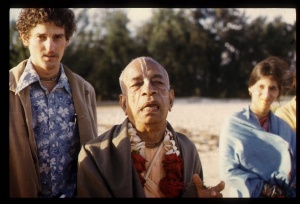SB 6.16.20: Difference between revisions
m (1 revision(s)) |
No edit summary |
||
| Line 1: | Line 1: | ||
{{info | {{info | ||
|speaker=King Citraketu | |speaker=King Citraketu | ||
|listener=Lord | |listener=Lord Viṣṇu the Supreme Personality of Godhead | ||
}} | }} | ||
[[Category:Srimad-Bhagavatam - Canto 06 Chapter 16]] | |||
[[Category:Bhagavatam Verses Spoken by Citraketu Maharaja - Vanisource|061620]] | |||
<div style="float:left">'''[[Srimad-Bhagavatam]] - [[SB 6|Sixth Canto]] - [[SB 6.16: King Citraketu Meets the Supreme Lord|Chapter 16: King Citraketu Meets the Supreme Lord]]'''</div> | |||
<div style="float:right">[[File:Go-previous.png|link=SB 6.16.18-19]] '''[[SB 6.16.18-19]] - [[SB 6.16.21]]''' [[File:Go-next.png|link=SB 6.16.21]]</div> | |||
{{RandomImage}} | |||
==== TEXT 20 ==== | ==== TEXT 20 ==== | ||
<div class="verse"> | |||
<div | :ātmānandānubhūtyaiva | ||
ātmānandānubhūtyaiva | :nyasta-śakty-ūrmaye namaḥ | ||
nyasta-śakty-ūrmaye namaḥ | :hṛṣīkeśāya mahate | ||
hṛṣīkeśāya mahate | :namas te 'nanta-mūrtaye | ||
namas te 'nanta-mūrtaye | |||
</div> | </div> | ||
| Line 17: | Line 22: | ||
==== SYNONYMS ==== | ==== SYNONYMS ==== | ||
<div class="synonyms"> | |||
<div | ''ātma-ānanda''—of Your personal bliss; ''anubhūtyā''—by perception; ''eva''—certainly; ''nyasta''—given up; ''śakti-ūrmaye''—the waves of material nature; ''namaḥ''—respectful obeisances; ''hṛṣīkeśāya''—unto the supreme controller of the senses; ''mahate''—unto the Supreme; ''namaḥ''—respectful obeisances; ''te''—unto You; ''ananta''—unlimited; ''mūrtaye''—whose expansions. | ||
ātma- | |||
</div> | </div> | ||
| Line 25: | Line 29: | ||
==== TRANSLATION ==== | ==== TRANSLATION ==== | ||
<div class="translation"> | |||
<div | |||
Perceiving Your personal bliss, You are always transcendental to the waves of material nature. Therefore, my Lord, I offer my respectful obeisances unto You. You are the supreme controller of the senses, and Your expansions of form are unlimited. You are the greatest, and therefore I offer my respectful obeisances unto You. | Perceiving Your personal bliss, You are always transcendental to the waves of material nature. Therefore, my Lord, I offer my respectful obeisances unto You. You are the supreme controller of the senses, and Your expansions of form are unlimited. You are the greatest, and therefore I offer my respectful obeisances unto You. | ||
</div> | </div> | ||
| Line 32: | Line 35: | ||
==== PURPORT ==== | ==== PURPORT ==== | ||
<div class="purport"> | |||
This verse analytically differentiates the living entity from the Supreme Lord. The form of the Lord and the form of the conditioned soul are different because the Lord is always blissful whereas the conditioned soul is always under the threefold miseries of the material world. The Supreme Lord is ''sac-cid-ānanda-vigraha'' (BS 5.1). He derives ''ānanda'', bliss, from His own self. The Lord's body is transcendental, spiritual, but because the conditioned soul has a material body, he has many bodily and mental troubles. The conditioned soul is always perturbed by attachment and detachment, whereas the Supreme Lord is always free from such dualities. The Lord is the supreme master of all the senses, whereas the conditioned soul is controlled by the senses. The Lord is the greatest, whereas the living entity is the smallest. The living entity is conditioned by the waves of material nature, but the Supreme Lord is transcendental to all actions and reactions. The expansions of the Supreme Lord's body are innumerable (''advaitam acyutam anādim ananta-rūpam'' (BS 5.33)), but the conditioned soul is limited to only one form. From history we learn that a conditioned soul, by mystic power, can sometimes expand into eight forms, but the Lord's bodily expansions are unlimited. This means that the bodies of the Supreme Personality of Godhead have no beginning and no end, unlike the bodies of the living entities. | |||
</div> | |||
<div | <div style="float:right; clear:both;">[[File:Go-previous.png|link=SB 6.16.18-19]] '''[[SB 6.16.18-19]] - [[SB 6.16.21]]''' [[File:Go-next.png|link=SB 6.16.21]]</div> | ||
__NOTOC__ | |||
</div> | __NOEDITSECTION__ | ||
__NOTOC__ | |||
Revision as of 07:13, 14 May 2021

A.C. Bhaktivedanta Swami Prabhupada
TEXT 20
- ātmānandānubhūtyaiva
- nyasta-śakty-ūrmaye namaḥ
- hṛṣīkeśāya mahate
- namas te 'nanta-mūrtaye
SYNONYMS
ātma-ānanda—of Your personal bliss; anubhūtyā—by perception; eva—certainly; nyasta—given up; śakti-ūrmaye—the waves of material nature; namaḥ—respectful obeisances; hṛṣīkeśāya—unto the supreme controller of the senses; mahate—unto the Supreme; namaḥ—respectful obeisances; te—unto You; ananta—unlimited; mūrtaye—whose expansions.
TRANSLATION
Perceiving Your personal bliss, You are always transcendental to the waves of material nature. Therefore, my Lord, I offer my respectful obeisances unto You. You are the supreme controller of the senses, and Your expansions of form are unlimited. You are the greatest, and therefore I offer my respectful obeisances unto You.
PURPORT
This verse analytically differentiates the living entity from the Supreme Lord. The form of the Lord and the form of the conditioned soul are different because the Lord is always blissful whereas the conditioned soul is always under the threefold miseries of the material world. The Supreme Lord is sac-cid-ānanda-vigraha (BS 5.1). He derives ānanda, bliss, from His own self. The Lord's body is transcendental, spiritual, but because the conditioned soul has a material body, he has many bodily and mental troubles. The conditioned soul is always perturbed by attachment and detachment, whereas the Supreme Lord is always free from such dualities. The Lord is the supreme master of all the senses, whereas the conditioned soul is controlled by the senses. The Lord is the greatest, whereas the living entity is the smallest. The living entity is conditioned by the waves of material nature, but the Supreme Lord is transcendental to all actions and reactions. The expansions of the Supreme Lord's body are innumerable (advaitam acyutam anādim ananta-rūpam (BS 5.33)), but the conditioned soul is limited to only one form. From history we learn that a conditioned soul, by mystic power, can sometimes expand into eight forms, but the Lord's bodily expansions are unlimited. This means that the bodies of the Supreme Personality of Godhead have no beginning and no end, unlike the bodies of the living entities.